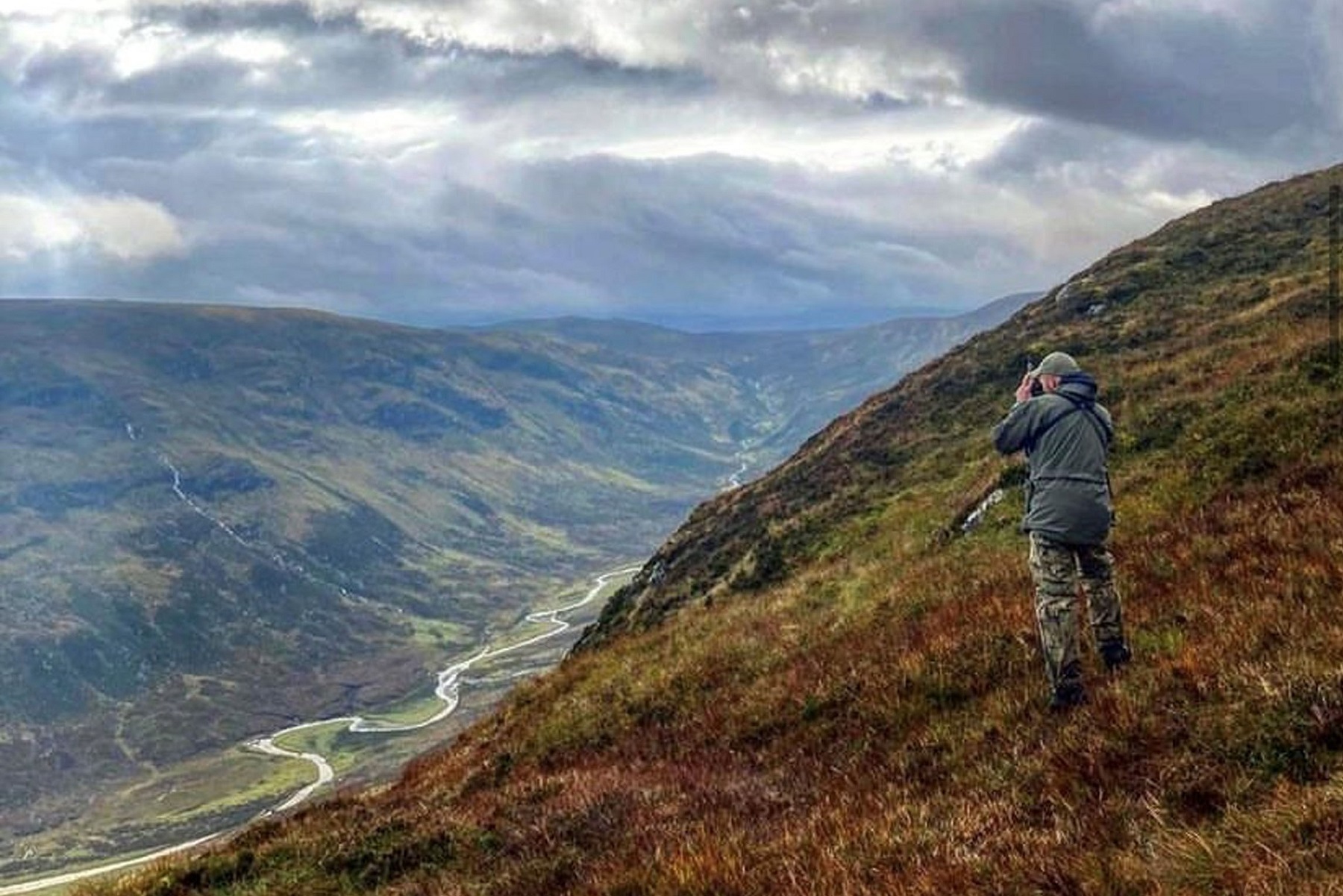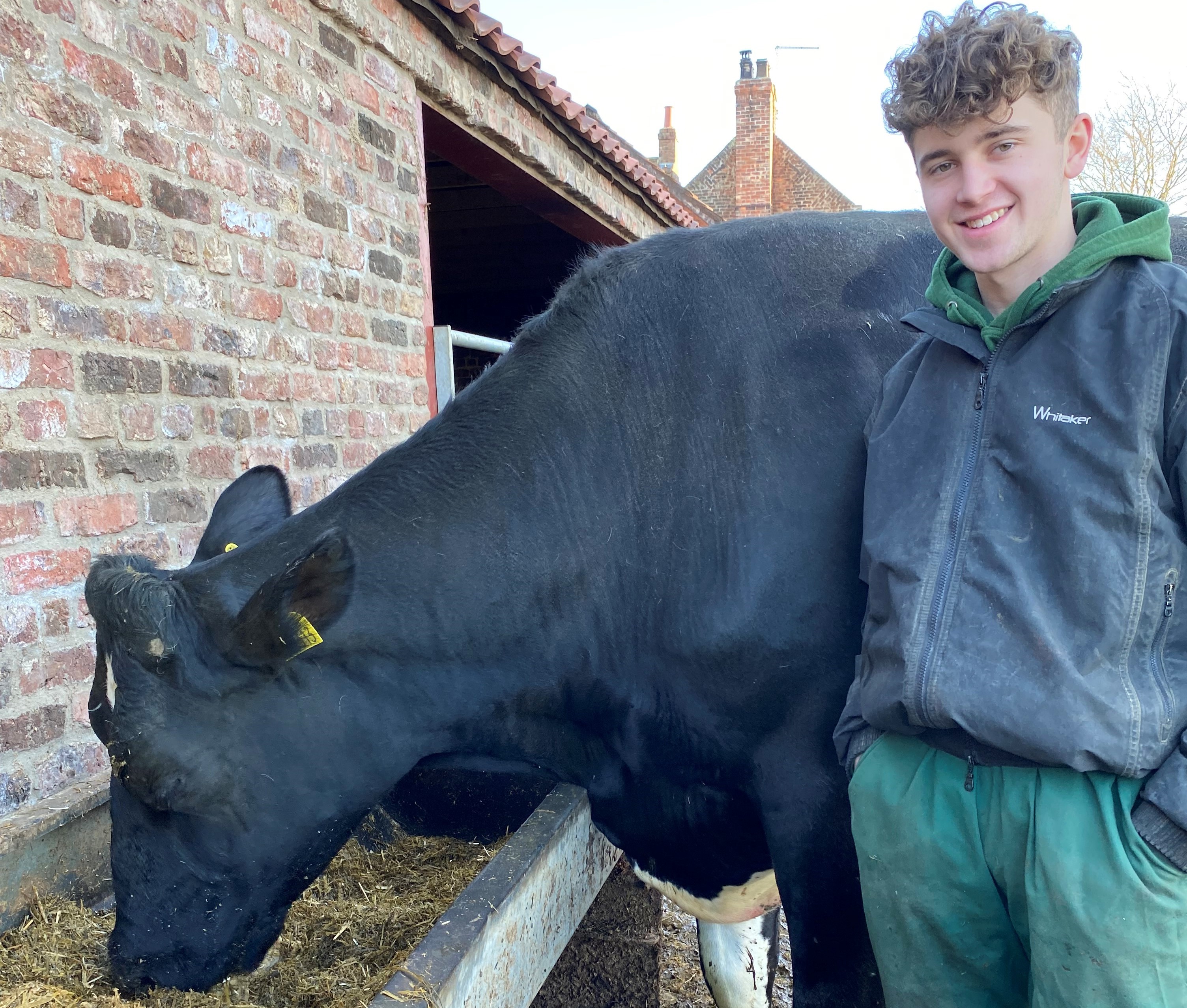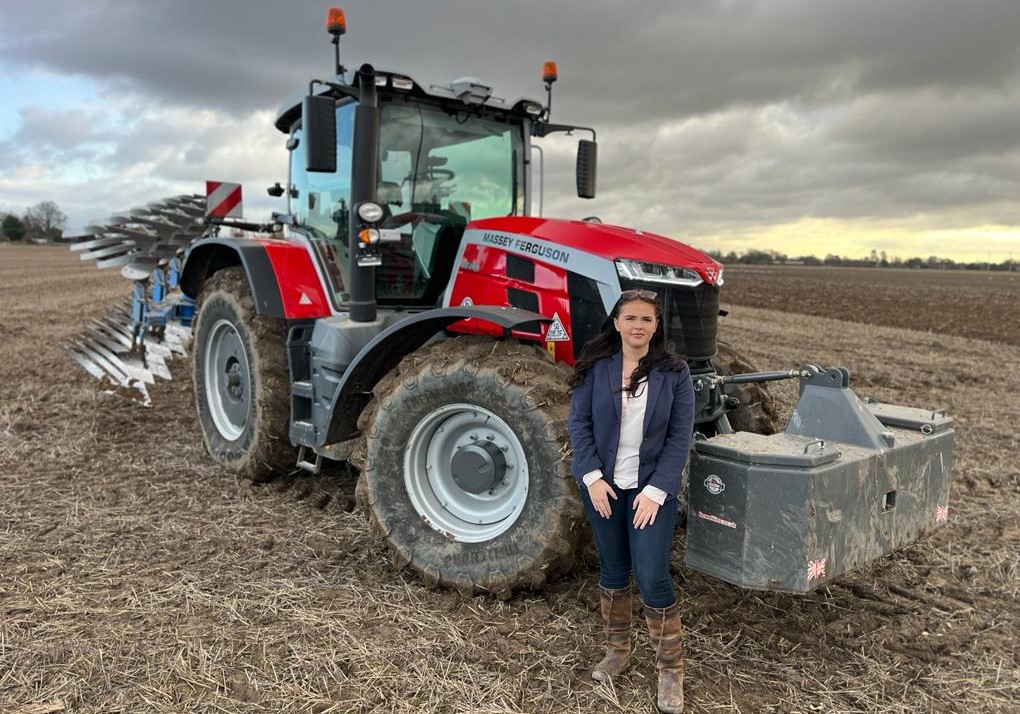

I work as a gamekeeper on a 24,000 acre traditional estate, Glendoe Estate, near Fort Augustus in the Highlands. I help with sporting activities as well as day-to-day running of the estate, which employs 4 full-time gamekeepers, 2 shepherds, and a variety of part-time and seasonal staff.
I’ve worked there for 6½ years but my career began when I left school and started work as a gamekeeper at Dunmaglass Estate alongside doing a game and wildlife management course at North Highland College UHI.
I trained there for four years and did a Modern Apprenticeship. It was really enjoyable as I had the chance to socialise with like-minded young people and learn new skills. The other great thing about working was that I was getting paid while learning, and that was essential to cover my living costs as I lived in placement accommodation.
Doing this qualification has helped massively with my career as the block release aspect and practical knowledge of the course have given me an in-depth knowledge of my role and given employers confidence that I can carry out my job efficiently.
Having been brought up in a rural area I had always wanted to do this kind of work and so appreciated what gamekeepers and farmers do to enhance wildlife and the countryside. What I do each day varies through the year, but basically I manage the countryside to benefit game populations as well as other wildlife. I am particularly proud of the part I have played in this, as some species of wildlife wouldn't be here if it weren't for the contributions of the industry I am part of.
During the shooting season I manage deer numbers by taking clients stalking and on years where we have a sporting surplus of grouse I manage driven grouse shoot days. We also have a low ground shoot where I assist the team in rearing pheasants and running shoot days.
My job helps to provide an environment which is rich in biodiversity, creating habitats for wildlife which is sometimes struggling in areas where this kind of management is lacking. Ground nesting birds such as red grouse, curlew, lapwing, oyster catchers, black grouse, redshank, golden plover, ring ouzels, and mountain hares and raptor species all benefit.
In this job, you need to be hardworking, able to communicate, have a good level of fitness and be resourceful. There are two mountains over 2,500 feet called Corbetts on the estate which are regularly used by hill walkers, so I regularly meet the public.
I love working in the countryside and have a passion for country sports, but the best thing about my job is getting up close to amazing wildlife. I get to see golden eagles soaring, red stags grazing the moorland, and lots of endangered waders which can be rare on unmanaged areas. I love living and working in this part of Scotland! Most of the guests we have remind us of just how beautiful it is.
Although there are challenges associated with my job, it is a very rewarding career in which you meet some great people, get to take part in exciting activities and spend most of your life outside surrounded by beautiful scenery and wildlife.
James Chapman is the fourth-generation to work at his family's farm, Hunt Hill, in Driffield, East Riding of Yorkshire.
Newly qualified as a Level 2 General Farm Worker apprenticeship, James (17) is passionate about carrying on a family tradition stretching back to 1944 when his great grandfather first launched the business.
Hunt Hill's 300 acres are devoted to arable and dairy farming - 120 of them yielding higher tier quality milk from the family's 135 pedigree Holstein cows, with wheat, barley and maize grown on the remaining land for cattle feed.
"I've grown up with farming in my blood," says James, who tends his own flock of pedigree Suffolk sheep, "and I knew very early on that it was what I wanted to do as a career.”
"My dad and grandad both work full time on the farm - Grandad is 80 and probably works hardest of us all," he laughs.
Qualifying in January 2023 from the two-year course he began in October 2021, James almost forgets to mention that he completed his Level 2 eight months early from Askham Bryan College, near York.
"The course work was challenging but really interesting and covered animal health and welfare, biosecurity and legislation, machinery and the process from seeding to harvesting. I learned a lot and everything on the course was relevant to my job.
"I also liked the end-point assessment being conducted at the farm," James adds. "The assessor arrived at 9am and questioned me in the workplace throughout the day."
Eager to progress further in farming, James is already planning his next move to upskill. "I am thinking about starting my Level 3 this autumn," he reports. "If I'm to head up the family business one day, I need to continue learning. Training helps you expand your ambitions and gives you fresh ideas to apply on your own farm."
Meanwhile he knuckles down to what many would view as an exhausting schedule for the day job. When taking his turn at milking, he rises at 4.30am. "I prefer milking in the morning, which takes about two and a half hours, and I enjoy mixing the ration for the cows.” James feels fortunate to be involved in both dairy and arable farming.
How about the highs and lows of his work? "Mucking out is probably my least favourite job - every three weeks I help lead away 300 tonnes of manure. We are involved in a muck for straw agreement with a nearby arable farmer.”
The family firm can look forward to what promises to be a sustainable future, it seems. "Farming is a happy life for me," James concludes. "I don't see it as a job but a way of life. The work ethic is big but so enjoyable."
My job in three words: "fun, busy, inspiring"


Newly qualified Crop Technician Angus Fox loves the great outdoors. When he's not playing rugby for the local team Market Deeping, he's game or clay pigeon shooting.
"I've got my work/life balance back with weekends now free for leisure," says the 19-year-old, who passed his Level 3 apprenticeship from Riseholme College in Lincoln in September 2022.
He upskilled while working at Vine House Farm in Deeping St Nicholas, Lincolnshire, completing his apprenticeship four months early. "I miss farming," he says, "and will always be a country boy at heart. It's in my chinos.”
"The Ag sector is one big family; everyone is so passionate about it. You have your moments - tractors break down and things go wrong - but it's a way of life."
Angus has moved into a role as a seed sales specialist with Grainseed and will now have a strong presence on the farm supporting merchants, and agents all over the country selling everything from grass seed, maize and, other forage seeds to gravel bags, as well as additives, silage sheets and everything cereal to livestock and arable farms.
"I should clock up 25,000 to 40,000 miles a year but driving's great so I couldn't wish for a better career move," he enthuses.
Angus started working life as a window fitter before his switch to farming with the realisation that he needed to become skilled to progress further.
"They were a great bunch on my course, and we all became really good mates and keep in touch.
"My tutor, Trevor CaIrns, really inspired me. He kept pushing and prodding and knew just how to teach and motivate, spending time with me. It was Trevor who helped place me at Vine House Farm for my apprenticeship.
"All he wants is the very best for his students. After completing the course, we discussed a load of career options. I think he was just as happy as I was when I landed the job at Grainseed."
"I adored driving tractors, so I was really interested in the elements of the course dealing with how to get the best out of them and implements."
But crop health and nutrition also proved a captivating topic. "It's at the heart of everything farmers do" he states.
Where does he see himself in a few years? "Well, I'd like to become the company's top salesman. I'm a natural, people tell me - very talkative and confident".
"Sales can be hard work and I'm learning all the time from my work colleagues," he adds. "They are the best aspect of the job. They have so much knowledge – there’s not a great deal they don’t know regarding all the different varieties of crops we sell.
"And they told me that most of the questions my customers ask me they already know the answers to - they just want to find out if I know what I'm talking about. A very handy tip."
Clearly in his element, Angus has wasted no time putting the knowledge and skills he acquired on his Level 3 apprenticeship to good use in an environment where he already feels well at home in.
"Still early days for me I know but there are no downsides to the job. I'm committed to learning as much as I can to achieve. I enjoyed the classroom environment as well as the hands-on side - tractor driving was a thrill, on your own, outdoors, doing your own thing - but it's time to move on to the next stage."
My job describes in three words: "Challenging but fulfilling”.
Holly Turner has grown up with farming. "It's been bred into me. I used to sit with my dad in the tractor from when I was little and loved playing out in the fields," she reveals.
"Dad has always been my inspiration - watching him at work, how he did things, being with him out there every day."
Holly's granddad, John, founded J B Turner Roses around 1980 in Wisbech, Cambridgeshire. Her dad, Nick, then started working for him in 1993, before starting his own farming business in 2008. She's now putting her experience of life on the farm to fruitful use by qualifying in the kinds of work she undertakes day to day.
Newly armed with a distinction as a Level 3 Crop Technician apprenticeship gained through Riseholme College in Lincoln, Holly (19) divides her days between arable and horticultural tasks on the farm's 450 acres.
"I've worked here since I was 15 - it's a tough life and can drain you physically and mentally," Holly states. "You don't have much social life but many of those I met on the course are farmers, so we keep in touch to see how we're all doing and to swap ideas."
Turner's is famed for its rose growing - they nurture around a million bushes a year in the rich silty soil, all destined for supplier David Austin Roses' in Wolverhampton.
"Granddad started growing them over 40 years ago," explains Holly. "They occupy around 40 acres and spend two years in the ground before we lift them for transporting.
"We plant generic stocks in March, then budwood is grafted on to them in June, July and August to create the hundreds of different varieties. David Austin Roses specify the numbers of which varieties they want. This often clashes with harvest, leading to some long, tiring hours during this season.
"Lifting usually starts in October and finishes just after Christmas. The bare root plants are collected into large cages in bundles of ten and moved off the farm by lorry every day. Lifting can often clash with drilling of the winter wheat."
“There's never enough time in what is such a short season," Holly adds. "Planting time for roses coincides with our potato planting and drilling of spring beans."
Weather can wreak havoc with the schedule though. "Before Christmas we had frost for eight days straight and couldn't get the lifter into the ground so had to stop," she recalls.
Holly's work varies with the seasons. "No day is ever the same," she says, "and you have to expect the unexpected. I'm on the fields most days, using gas guns to scare off the pigeons - and there are plenty of them. Then from November to February we have the pheasant shoot."
"I love harvest time when the combine comes out, which Dad drives. The tractors and trailers are mine and my sisters' job. After harvest, it is my job to get on with all the primary cultivations, getting ready for the next crops.
"Mum (Lucy) handles the office side of the business, paying bills and other paperwork, while helping out with harvest jobs too."
Farming is not always a joyous time, Holly confesses - "I hate standing in the workshop in the cold," she reveals.
Aside from upskilling in farm duties, her course has brought other benefits, despite the six-month delay due to covid restrictions. "I'm really glad I did the apprenticeship. It gave me a deeper understanding of farming, like cropping, as well as the soil science.
"The value of training is all about learning other, more efficient ways of doing things. Some of them I'd like to introduce on the farm.
"I would like to gain my HGV licence at some stage. It's a big move but once I have it, hopefully we can look at buying a lorry. This would then enable us to transport the roses to David Austin, instead of relying on contractors to collect and deliver them. This is my business proposal! The lorry will be pink," she adds with a smile.
Striking up friendships proved a major plus Holly took from her apprenticeship, which saw her in the classroom every other Friday. "I applied to the college with one of my best friends from school, which helped me a lot because I was the only girl on the course.
"That was scary at first but I'm a determined person who likes to prove people wrong.’’
The intensity of living and working every day in a family setting has eased, Holly says, now she has separated the two. "I didn't have a work/life balance before but I now live with my boyfriend - about 40 minutes' drive away - and the commute gives me time to wake up and prepare myself for the day. If I have to work late, I know that I can sleep over at mum and dad's.
"My boyfriend works on a 15,000-acre farm, driving one of the combines amongst other things, so he can get really busy too."
Holly's love of driving vehicles has translated into possible career progression. "I've always wanted to go into machinery sales," she says. Wouldn't that mean a move away from the family business? How would mum and dad feel? "They would be happy if I stayed with farming but they have always wanted me to follow my ambitions, so we'll have to see."
Summing up her farming life, Holly concludes: "It's harsh but rewarding."
